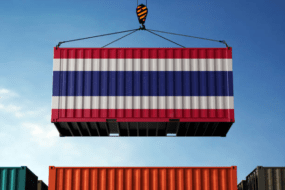- Home
- Trade News
- The Different Types of Trade D ...

Various types of trade data
Trade data is a useful resource for companies of all sizes and in all sectors. The dynamics of the supply chain are also significant insights on market trends and consumer demand. The numerous types of trade data that are available and the various applications for business analysis and decision-making will be covered in this blog.
Import Data and Export Data
The most common kind of trade data is perhaps import-export data. It offers details on the transnational flow of goods, including the quantity, cost, and country of origin and destination of the goods. Usually, government organisations like customs departments gather this information, and it is frequently made available to the general public.
Import-export data has many applications. Businesses might use it, for example, to find new market opportunities and gain a better understanding of their rivals. Businesses can determine which products are in high demand and which nations are importing/exporting them by examining import-export statistics. This data can assist companies in expanding their consumer base, finding new suppliers, and customising their goods and services to fit market demands.
Shipping Data
Shipping data reveals information on how items are transported from one place to another. This information is often gathered by logistics firms, including freight forwarders, and it is frequently used to monitor a shipment’s transit from its origin to its destination.
Supply chain management can be enhanced by using shipping data because it gives instantaneous insight into the flow of merchandise. This data can be used to spot possible supply chain delays or interruptions and take preventative action before they become a problem. Additionally, shipping data can be used to streamline deliveries and cut back on transportation expenses, which would benefit firms’ bottom lines.
Customs Data
The information on items’ import and export, as well as the customs duties and taxes levied on them, is provided by customs data. Customs authorities often gather this information, which is frequently used to enforce trade laws and raise money.
Businesses can examine the effects of trade restrictions on their operations and identify potential trade obstacles using customs data. Businesses can, for instance, discover nations that place high tariffs on their products by examining customs data, and they can modify their pricing strategy accordingly. Additionally, you may use customs data to spot possible compliance problems and fix them before they become a problem.
Different ways in which trade data can be used for business analysis and decision-making

Market research
Businesses can use trade data to better understand market trends, which will enable them to spot expansion opportunities. For instance, import-export information can show which nations are importing or exporting particular categories of products and services, enabling companies to locate potential new markets for their goods. By providing data on the market share of various companies and the pricing strategies of their rivals, trade data can also help businesses better understand the competitive environment in their industry.
Supply chain administration
By identifying areas where costs can be decreased and efficiency can be increased, trade data can be used to improve supply chain management. In order to help businesses decide how to ship their products to various markets, shipment data, for instance, can show which transportation routes are the most affordable. Additionally, by identifying potential supply-chain bottlenecks like delays in customs clearance, businesses can take corrective action with the aid of trade data.
Risk management
Customs data can be used to identify potential risks related to doing business with particular nations or suppliers, enabling businesses to choose partners more wisely. For instance, customs data may show that a specific supplier has a history of exporting fake goods or breaking import-export laws, which could harm the supplier’s reputation or cause legal problems for the importing company. Businesses can take action to reduce risks and safeguard themselves from potential harm by using customs data to identify potential risks.
Compliance
Trade data can be used to monitor import-export regulations’ observance and to spot any potential risks to compliance. Instances of discrepancies between the declared value of goods and their actual value can be found in customs data, which may indicate fraud. Businesses can spot potential problems early and take corrective action to ensure that they continue to comply with import-export regulations by using trade data to monitor compliance.
In conclusion, trade data is an effective tool for companies looking to understand the global economy and make defensible choices about risk management, compliance, and supply chain management. Businesses can achieve long-term success by utilising the various trade data types that are available and gaining a competitive edge in their sector.
Accessing and utilising different types of trade data

Businesses can use a variety of sources, such as government agencies, market research companies, and data suppliers, to get trade data. Here are some methods for gaining access to and using various kinds of trade data for market analysis and trend spotting:
Access import-export statistics from governmental agencies like the U.S. Census Bureau or Eurostat of the European Union. These agencies offer information on the price, volume, and location of imported and exported items. Utilise this information to find new markets for your goods, monitor the competition, and spot shifts in global trade patterns.
Shipping data can be obtained via freight forwarders or shipping firms. The carrier, shipment route, and status of the delivery of the products are all disclosed by this data. Analyse shipping data to enhance logistics planning, assure prompt customer delivery, and optimise supply chain operations.
Access customs data by contacting organisations like the World Customs Organization or US Customs and Border Protection. The value, quantity, and description of the products being imported or exported, as well as any applicable duties, taxes, or fees, are all included in customs data. Use this information to manage your trade compliance duties, discover potential dangers in international business, and cut costs.
If acquiring trade data via these routes proves to be difficult, you can turn to our platform, TradeData.Pro, which provides thorough access to all the trade data you need. By giving you precise and current information on international trade flows, our platform is intended to assist you in doing market analysis and making informed business decisions.
Examples of trade data analysis across different industries
Analysing trade data has applications in many different businesses. Here are a few instances of effective trade data analysis in various industries:
Fashion industry: Trade data analysis can assist fashion businesses in identifying new trends and product demand. For instance, Asian businesses, as the top choice for garment manufacturers, might examine import-export data to help in determining the markets with the highest growth rates for particular product categories. Additionally, through customs data, Asian garment manufacturers can spot changes in tariff rates and modify their pricing plans as necessary. This is particularly important in the highly competitive fashion industry, where pricing can make or break a product’s success. By staying informed about changes in tariff rates, manufacturers can adjust their pricing strategies to maintain their competitiveness in the global marketplace.

Automotive industry: Automotive businesses can utilise trade data analysis to find possible suppliers, keep track of supply chain developments, and keep an eye on rivals. Consider the growing Vietnamese automotive industry. Vietnamese car manufacturers might analyse import-export data to assist them in identifying emerging markets for particular vehicle categories and shipping data to assist in locating potential supply chain bottlenecks, ultimately leading to increased market share and profitability.

Food industry: In the context of Turkish agriculture suppliers, which are among the largest agricultural producers in the world, analysing trade data can provide valuable insights that can aid in making informed business decisions. For instance, examining import-export data can help identify the countries that are importing the most Turkish agricultural products and the types of products that are in high demand. This data can help Turkish agriculture suppliers tailor their products to meet the needs of these markets and expand their customer base. Moreover, through customs data, they can identify potential issues related to international trade, such as food safety concerns or regulations that could impact their ability to export their products to certain markets. This data can help suppliers take proactive measures to ensure compliance with regulations and maintain the quality of their products.

PS: Read this blog post to learn about how to leverage Import & Export Data in Trade.
Your Trusted Source for Trade Data: TradeData.Pro.
Trade Data Pro stands as a beacon of reliability in the sphere of trade data, originating from the economically robust and politically stable environment of Singapore. This esteemed platform is a brainchild of the Commodities Intelligence Centre, a notable government-linked entity and a synergistic joint venture involving Zall Smartcom, Singapore Exchange (SGX), and Global eTrade Services (GeTS). Since making its debut in 2018, Trade Data Pro has garnered acclaim for its expansive coverage, cost-effectiveness, and swift response time, earning prestigious accolades such as the Singapore Quality Class (2020), Stevie Award Gold (2021), Crozdesk 2023 Happiest Users Award, 2023 Slashdot Top Performer, and 2023 Source Forge Top Performer.
With widespread recognition, Trade Data Pro has been spotlighted in numerous reputed news outlets, including Bloomberg, Business Times, MarTech Series, ACN News, and more, further cementing its status as a reputable source in the industry. User satisfaction remains paramount, reflected by stellar average ratings of 5 stars on leading review platforms like SourceForge, Capterra, G2, and others. This unanimous user acclaim speaks volumes about the platform’s unyielding commitment to quality and customer satisfaction.
In a world where procuring pivotal data for unmasking trends, pinpointing market openings, keeping tabs on the competitive landscape, and comprehending supply chain potential has traditionally been daunting, Trade Data Pro simplifies this endeavour. The platform meticulously collates and curates shipment data mandated by governmental import-export filings, presenting it as actionable business intelligence. This treasure trove of information facilitates a crystal-clear understanding of goods movement across international borders and is encapsulated within the largest searchable trade database globally available.
For businesses eyeing the vibrant Vietnamese industry, Trade Data Pro offers up-to-date data. Engage with our intuitive platform to discover products that align with your interest by exploring our trade database demo: Vietnam Import Export Data. For historical insights into penetrating new markets, kindly visit our Trade Database Demo.
For a dynamic understanding of our platform’s operations, view the video linked below or visit YouTube. With Trade Data Pro, you’re not just accessing data; you’re unlocking a gateway to informed, strategic global trade decisions.








